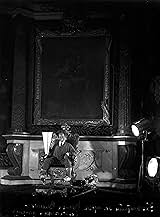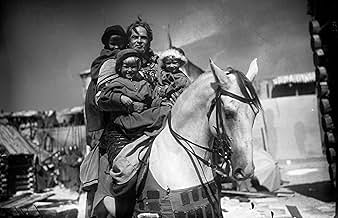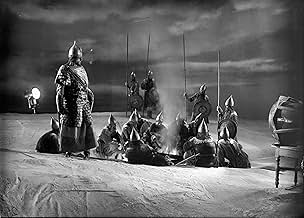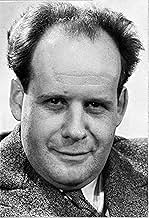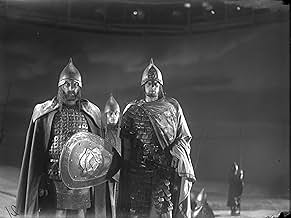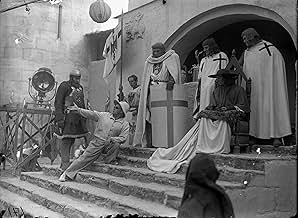NOTE IMDb
7,5/10
13 k
MA NOTE
Ajouter une intrigue dans votre langueThe story of how a great Russian prince led a ragtag army to battle an invading force of Teutonic Knights.The story of how a great Russian prince led a ragtag army to battle an invading force of Teutonic Knights.The story of how a great Russian prince led a ragtag army to battle an invading force of Teutonic Knights.
- Réalisation
- Scénario
- Casting principal
- Récompenses
- 2 victoires au total
Nikolay Cherkasov
- Aleksandr Nevsky
- (as N. Cherkasov)
Nikolai Okhlopkov
- Vasili Buslai
- (as N. Okhlopkov)
Andrei Abrikosov
- Gavrilo Oleksich
- (as A. Abrikosov)
Dmitriy Orlov
- Ignat - the Master Armorer
- (as D. Orlov)
Vasili Novikov
- Pavsha - Governor of Pskov
- (as V. Novikov)
Nikolai Arsky
- Domash Tverdislavich - a Novgorod Boyar
- (as N. Arsky)
Varvara Massalitinova
- Amelfa Timoferevna - Buslai's Mother
- (as V. Massalitova)
Valentina Ivashova
- Olga Danilovna - a Maid of Novgorod
- (as V. Ivashova)
Aleksandra Danilova
- Vasilisa - a Maid of Pskov
- (as A. Danilova)
Sergei Blinnikov
- Tverdilo - Traitorous Mayor of Pskov
- (as S. Blinnikov)
Ivan Lagutin
- Anani - a Monk
- (as I. Lagutin)
Lev Fenin
- The Archbishop
- (as L. Fenin)
Naum Rogozhin
- The Black-Hooded Monk
- (as N. Rogozhin)
Nikolai Aparin
- Mikhalka
- (non crédité)
Boris Belyakov
- Rytsar
- (non crédité)
A. Gulkovski
- Teutonic Knight
- (non crédité)
Avenir Gulkovskiy
- rytsar Tevtonskogo ordena
- (non crédité)
Avis à la une
I think it's a superb cinematography experience, once again Einsenstein goes beyond the conventional visual elements of the movies, lets take an example, we are used to see the white color as a sign of purity, and the black color as the "bad" element. Here this visual elements are twisted, showing the enemy in white and the russians in dark uniforms. Certainly there is a propaganda tone in the whole story, but it's quite comprehensible for the time (previous to WWII) and the country. There is another element for which this movie is so touching, the excellent music by Serge Prokofiev, and specially the part of the battle. Alexander Nevsky is very much worth seeing not seeking for a conventional war movie, but as an alternative way of cinematic expression.
Guys, before saying that Alexander Nevsky is a propaganda film, please keep in mind that it is about a Russian saint, prince and patriot and it was produced in the country which totally denied religion, patriotism and nobility. If you look more attentively you can notice that the Novgorod churches had no crosses on top. The full helmets Eisenshtein took from ancient manuscripts and followed the history precisely. The portable organ the monk plays was an exact copy of the real thing from the 13th century which crusaders used. The children auto-da-fe was taken from ancient chronicles (both Russian and German). But in addition it had religious meaning since it draws parallel with Herod's slaughter of the innocents (used later once again in Ivan The Terrible). Alexander Nevsky is a Russian historical saga which has everything in common with old Russian cultural and historical tradition but nothing (or very little) with the Soviet propaganda. The film definitely has allusions to the Stalin's time: free Novgorod republic fights for its freedom at the expense of prosperity, elected prince Alexander (leader but not czar) etc. But nevertheless I think that the French critic Robert Brasillach (he was very close to nazis) was right when he called Alexander Nevsky the slavic war carol which has nothing to do with bolshevism, communism etc.
But IMHO Serghey Eisenshtein was against the war and followed the tradition of War And Peace by Leo Tolstoy. The same plot with common people uniting to oppose the uppish professional army. If you remember the scene when Russian soldiers alike in color with the earth and trees butted into the German close formation they use axes the same way they did when chopping woods. No pride, honor or awards but every day job. I think it is an excellent film which is larger then our judgements.
But IMHO Serghey Eisenshtein was against the war and followed the tradition of War And Peace by Leo Tolstoy. The same plot with common people uniting to oppose the uppish professional army. If you remember the scene when Russian soldiers alike in color with the earth and trees butted into the German close formation they use axes the same way they did when chopping woods. No pride, honor or awards but every day job. I think it is an excellent film which is larger then our judgements.
Sergei Eisenstein's "Alexander Nevsky" is a biopic of the famous prince, but when released it was seen as an expression of the growing suspicion of Nazi Germany. Indeed, the battle scenes make the Teutonic Knights - aka the Germans - get depicted as faceless goons who have no qualms about killing anyone. The epic battle scene is probably the most well remembered scene in the movie. It basically says "If you invade Russia, expect the same fate as befell the Teutonic Knights." Hitler didn't heed the warning, and his hoped-for thousand-year Reich only lasted twelve years (the harsh winters didn't help matters).
Understanding that it's a form of propaganda, it's an impressive movie. I wouldn't expect otherwise from Eisenstein. If you're going to teach a course on Russian cinema, you would have to include this one. Excellent movie.
Understanding that it's a form of propaganda, it's an impressive movie. I wouldn't expect otherwise from Eisenstein. If you're going to teach a course on Russian cinema, you would have to include this one. Excellent movie.
10halsmith
There is a version of "Nevsky" that is shown with a live symphony orchestra, chorus, soloist and the movie. If it's EVER performed within a day's travel of you see "Nevsky" done that way. The Oklahoma City Philharmonic did it with the OKC Canterbury Choir (one of the finest anywhere) a couple of years ago. I think I cried through the whole thing, it was one of the most emotionally powerful movie experiences of my life. I'm listening to "Nevsky" on the radio right now and it still tears me up. There are movies that I love, and classical music pieces I love, but there is no combination I can think of that comes close to the impact of "Nevsky" performed in real time.
In 1242, Russia in being invaded by two sides: from the orient by the Mongols and from Europe side, by the Germans Teutonic Knights of the Holy Roman Empire. The city of Novgorod is the last free city in Russia. The population, in order to organize the defense of Novgorod and the lands of Russia, calls the Prince Aleksandr Nevsky, who had defeated the Swedish in a previous battle. His successful strategy defeats the Germans, after a great battle on a frozen lake. This movie was made in 1938 due to the threaten of the German to Russia, in a pre-Second World War period. The idea was to make propaganda pro-Russia. However, it is an overwhelming, marvelous, stunning powerful masterpiece. It is amazing the combat scene on the frozen lake. The present generation is very accustomed to special effects, like in the `Lord of the Rings' trilogy, and maybe cannot understand how fantastic is this black and white fight. If the viewer can forget the ideology and watch it as an art, he will certainly be astonished in the end with such a masterpiece. My vote is ten.
Title (Brazil): Alexander Nevsky
Title (Brazil): Alexander Nevsky
Le saviez-vous
- AnecdotesJoseph Stalin wanted this film to be a propaganda tool to warn Soviet citizens to be wary of German aggression. However, it was rejected at first due to it being "too anti-German", as it came out shortly before the Soviet-German non-aggression pact of 1939 was signed. In 1941, the peace was broken and Stalin reportedly demanded that it be shown in every Soviet movie theater as a rallying cry against the invasion.
- GaffesGavrila Alexich, one of the movie's main protagonists, could not participate in the Battle of Ice. He was killed one year before it, in 1241, storming the fortress of Koporye.
- Citations
Alexandr Nevsky: Go tell all in foreign lands that Russia lives! Those who come to us in peace will be welcome as a guest. But those who come to us sword in hand will die by the sword! On that Russia stands and forever will we stand!
- Crédits fousBefore the word "End" appears Alexandr Nevsky's famous quote "But those who come to us sword in hand will die by the sword! On that Russia stands and forever will we stand!" appears on the screen, right after Nevsky said it in the movie.
- Versions alternativesA new edition appeared on video in 1995 with the entire Prokofiev score newly recorded in hi-fi stereo, using the same 1938 orchestrations and perfectly synchronized to the original 1938 dialogue and sound effects tracks, so that it is now possible to see and hear the film exactly as it always was, with the exception being that the music is now heard in hi-fi sound, rather than the tinny 1938 recording.
- ConnexionsEdited into Les Sorciers de la guerre (1977)
Meilleurs choix
Connectez-vous pour évaluer et suivre la liste de favoris afin de recevoir des recommandations personnalisées
- How long is Alexander Nevsky?Alimenté par Alexa
Détails
Box-office
- Montant brut mondial
- 2 226 $US
- Durée
- 1h 30min(90 min)
- Couleur
- Mixage
- Rapport de forme
- 1.37 : 1
Contribuer à cette page
Suggérer une modification ou ajouter du contenu manquant

